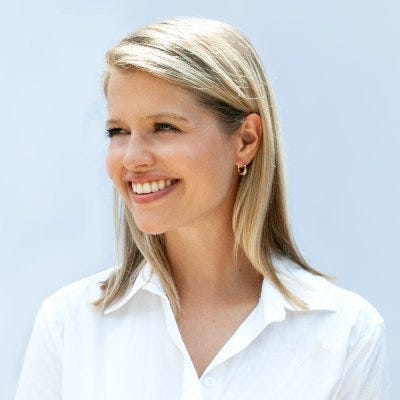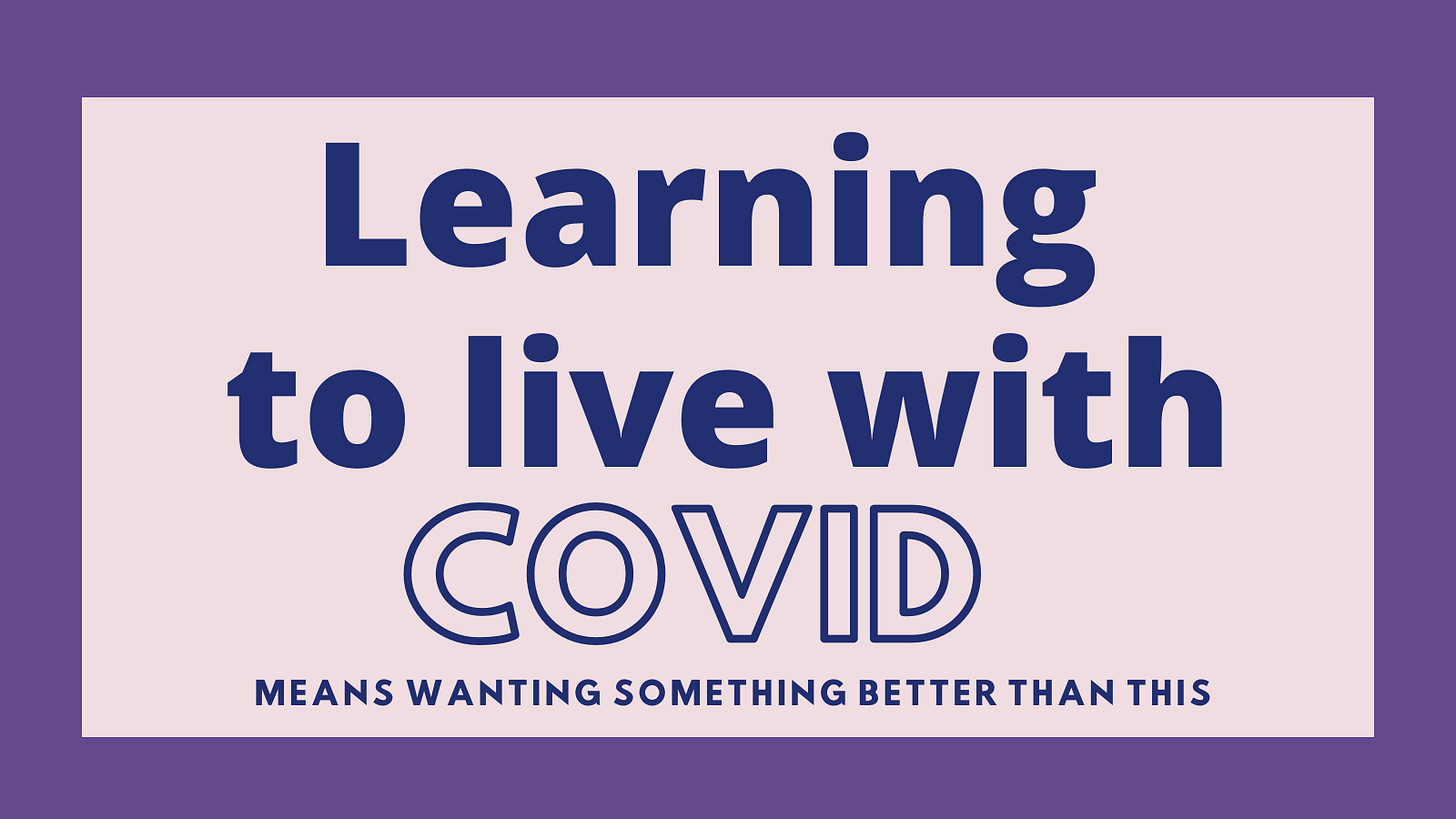Learning to live with Covid
In the moment + in the future
Welcome to At The End Of the Day. I’m Hannah Sung and I write this newsletter for a people-first perspective on the news. Subscribe and support the newsletter by paying-what-you-wish.
✨ ATEOD x joni ✨
I bet you’ve never heard of a company quite like joni. When you order, you get biodegradable pads and tampons delivered to your door and joni donates period supplies to people and communities who need them — 100,000 pads to date. Use ATEOD15 to get 15% off your next order or subscription. This newsletter receives a commission. Thank you to the joni team for working with me! Read more about why I love joni here.
Walking this tightrope
Since the very beginning of the pandemic, I’ve been struggling with being pragmatic versus optimistic. Like you, I’ve been preparing for the worst while hoping for the best and we’ve all been walking this tightrope for the better part of two years.
Now we’re in a fourth wave1, even after a massive vaccination push across Canada, and I’m trying to be very real with myself.
Voraciously consuming Covid news has become exhausting. Fearing September and back-to-school feels like Round Two of the worst merry-go-round2. I’m not sure if I have any nervous energy left.
All this time, the pandemic has us fearing the future while pinning our hopes on milestones like vaccines and summertime socializing. However, those bright lights are receding in the rearview mirror.
It’s time to learn to live with the virus
The idea of learning to live with Covid. I know — I don’t like it either.
Somewhere along the way, the idea of living with Covid became politicized. But it isn’t about giving up. We need to keep pushing political leaders to put public health guidance first (I can’t believe we need to be arguing so vociferously over vaccine passports3 -- parents know their kids already have them, they’re called immunization cards4).
For me, learning to live with Covid isn’t about skating off into the future with my double-vaxx status and waving over my shoulder. It isn’t controversial; there’s no hot take.
Living with Covid means facing the massive social and cultural change that frankly, was already on a trajectory -- technology, climate crisis, economy, labour rights -- and accelerated by this virus. It means not accepting it all as a status quo. It means continuing to advocate for the most vulnerable. It means being really aware in the moment but also feeling empowered to shape the future (I’m still thinking about Dr. Hubbard from my last newsletter, advising us to focus on the things we can control).5
Making sense of it
I believe we have more power than we realize. And while I don’t have the formula on how to live your best life during a pandemic (anyone out there still cooking actual meals?) I’m thinking about these things a lot:
Staying informed as much as possible. We need to keep up on news but also keep misinformation at bay, shutting the door to unverified information which can often come from people we otherwise love (it’s that last part that’s tough)
Balancing the news with a break. I took a very long break from news in July to just run and swim and make bracelets with my kids. Balancing our knowledge with perspective means giving ourselves time and space. A break can be the self-care we need
Talking with friends and family, not just about Covid, but about the social and cultural upheaval we are experiencing. They’re not the prettiest topics. They’re the thorny ones. And when people love us and we love them back, these tough issues can make us instantly “yelly” (it me, too). It’s tough but reflecting on how to have these conversations is the first step to having them and I believe these conversations are crucial. Your interactions at home can be as life-changing as any news story, even moreso, when it comes to people’s behaviour and outlook 6
Activism isn’t a bad word. And it can take so many forms. Some of us talk back to our political representatives in all the traditional ways (Do it! Leave that voice mail, send that email, write the open letter or sign the petition). But changing your personal habits, applying whatever you have (time, energy, money) to those already doing the work you want to see done in the world, this is also taking action to shape the future, too
Keep the wake-up calls
I’ve said this before but I really don’t want to let go of the wake-up calls we got in our own communities during the pandemic. There are more people than ever who are living in tents in my neighbourhood park. I want that fact to continue to be astounding, unacceptable, absurd and a continued indictment of our inadequate systems.
Living with Covid means incorporating all our pandemic eye-openers, all the ways we’re seeing what might have previously been invisible to us but in plain sight. After all, before the pandemic, I knew a lot less about:
Epidemiology and immunization. I used to just glide through life getting all the vaccines. Now I am not ready to deal with sending my kids back to school because they’re under 12 and therefore unvaccinated against Covid
The financialization of housing. The lack of affordable housing is a crisis. This particular issue is one where the systemic details are crushing 7
Public school. I’ve always been a stalwart believer that public school levels the playing field because it did — for me. I’ve since learned much more about the history of anti-Blackness and public school in Canada, for a podcast I worked on over the winter (I will be sharing it soon!). The point is that we need to hold our systems accountable, especially the ones we cherish
When I think about living with Covid, I think about running as an analogy because I’ve been doing it throughout the pandemic — more now that I’m seizing summer. I run because it makes me feel good in the moment but I also know that exercise is like “free money” for the future — if I can do it in the moment, it has good long-term effects for me when it comes to strength, health, all that stuff you already know about.
That’s the way I want to think about handling the life changes that come from Covid, too. Living in the moment with actions that yield a better future. I don’t want to just stew in the pragmatism. I want to live with optimism, too.
If you have thoughts on how you are learning to live with Covid, good or bad, I want to hear them. Just hit reply to this email.
Thanks, as always, for reading,
Hannah
✨✨✨ At The End Of the Day is edited by Laura Hensley ✨✨✨
👋👋👋 Please meet...
Every week, I hear back from many of you with super-thoughtful responses. For example, an email I got back from Miranda last week totally inspired my newsletter today (thank you!).
Now, I want to introduce you to each other.
I’m starting with ATEOD editor Laura Hensley, who is an amazing sounding board for me and an all-round gem of a person.
Name: Laura Hensley
What I do: Freelance journalist, journalism instructor and communications manager
Secret talent: I was a competitive Irish dancer growing up. I don’t dance much anymore, but can still do a jig!
What's on my mind: The role of the Catholic Church in Canada’s residential school system and the institution’s lack of accountability and apologies. After reading the incredible Globe and Mail feature on the church’s finances, it’s become even more infuriating that the church is taking so few steps towards reconciliation and reparations
What keeps me happy/grounded/elated/moving forward: Spending time with my 93-year-old grandma — she’s the wisest and kindest woman I know!
Thank you, Laura! I can tell I’m going to get a kick out of introducing readers to each other. Click here to tell us about yourself. I’d love to feature you, easy breezy, in an upcoming newsletter.
✨ Big thanks to joni for supporting my newsletter! Read more on my latest marketing collaboration and how you can use ATEOD15 to get 15% off period supplies delivered to your door. Check out joni here.
Giving back 🍎🥗
These days, as I’m reading about international locales in news headlines, I feel the urgency to act and I’m doing it locally.
I recently spoke with Roxanne Wright from Oasis, a community hub and food bank in west-end Toronto. A friend lives around the corner from Oasis and last year, she described to me how she saw the line for the food bank grow longer and longer down the street. She started to see people she knew in the line.
As Roxanne said to me, funding is tough because Covid grants have dried up but Covid itself hasn’t gone away. And the need has simply grown.
During the pandemic, Oasis staff have heard many people come in and say, “I never thought I’d use a food bank,” or “I’ve never used a food bank before.”
Food banks aren’t the answer to poverty. But living in the moment, which I aim to do, means supporting people in the moment.
If you’re with me, consider a donation to Oasis. I’ve become a monthly donor. If you’d rather donate to a community organization in your own neighbourhood, I love that. Please do ✌️
Further Reading
The time for debating COVID-19 vaccine passports is over, Globe and Mail
What are the vaccination policies at Ontario post-secondary schools? Here's what you need to know, CBC News
I need to stop scrolling, Galaxy Brain newsletter by Charlie Warzel
VoteHousing.ca A national non-partisan campaign to end homeless and make housing safe and affordable in Canada
99% of COVID deaths are now of unvaccinated people, experts say, CNET
You're a beautiful person with a body and a brain and a voice and you're alive right now, which is remarkably cool: A pep talk and back to basics report five days after the big report, Minimum Viable Planet newsletter by Sarah Lazarovic
Summer Hits: BTS — Butter (with Jenna Andrews), Switched on Pop. This is a fave podcast of mine. Music nerds are my people
How Should I Think about School & Child Care Now? You know, because Delta, Parent Data newsletter by Emily Oster
Amarnath Amarasingam on immunization cards. I just really liked this Tweet
How to handle fall, last week’s At The End Of the Day x Best Health Q&A with Dr. Janine Hubbard
Why Difficult Conversations Can Actually Be A Good Thing, Yes! Solutions Journalism
Financialization of Rental Housing, part of an explainer from Encampment Support Network Toronto





